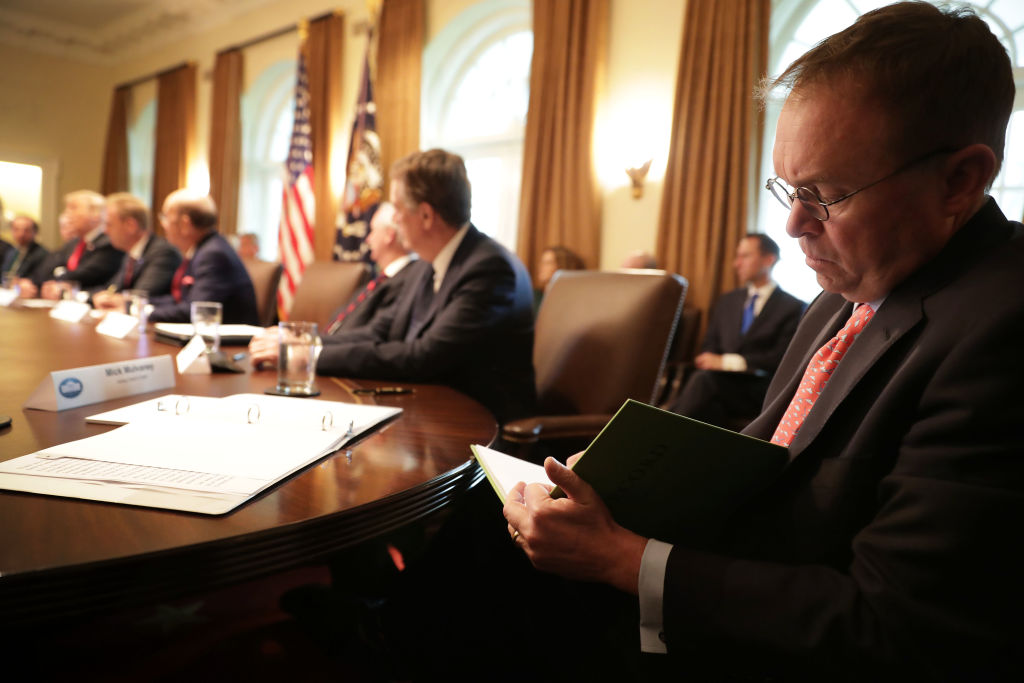Trump hated that his aides took notes, according to notes acquired by Mueller's team


A free daily email with the biggest news stories of the day – and the best features from TheWeek.com
You are now subscribed
Your newsletter sign-up was successful
There are many reasons people who work in the White House are reluctant to take notes, and traditionally they center around protecting the president. But lots of people in President Trump's White House took notes for the opposite reason, report Peter Baker and Annie Karni at The New York Times: to protect themselves against "a mercurial, truth-bending chief executive who often asked them to do things that crossed ethical or even legal lines, then denied it later."
Some notes by Trump staffers have ended up as tell-all books, but Special Counsel Robert Mueller's report also drew from contemporaneous notes, shining new light on Trump's actions — and his strong aversion to note-taking, especially since he can no longer rely on nondisclosure agreements.
Mueller's team obtained notes or contemporaneous memos from former White House Counsel Don McGahn, his deputy Annie Donaldson, former White House Chiefs of Staff Reince Priebus and John Kelly, former Trump campaign chiefs Paul Manafort and Corey Lewandowski, adviser Stephen Miller, and other advisers, lawyers, and government officials. Some of them kept notes of alarming conversations with Trump in safes, according to Mueller's report.
The Week
Escape your echo chamber. Get the facts behind the news, plus analysis from multiple perspectives.

Sign up for The Week's Free Newsletters
From our morning news briefing to a weekly Good News Newsletter, get the best of The Week delivered directly to your inbox.
From our morning news briefing to a weekly Good News Newsletter, get the best of The Week delivered directly to your inbox.
We know Trump hated note-taking from McGahn's notes and Trump himself, who alleged in a Friday tweet that some "so-called 'notes' ... never existed until needed" and contained "total bullsh--." Trump also publicly berated former National Security Adviser H.R. McMaster for taking copious amounts of notes, the Times reports.
W. Neil Eggleston, who served as a lawyer for President Bill Clinton and as president Barack Obama's White House counsel, told the Times he "didn't take notes when I worked with either president," but to protect the presidents, not make sure he wasn't "part of a criminal conspiracy," like Trump's aides. "To create records of information that was quite harmful to the president, that is really remarkable," he added. "And to do it and then stay on and continue to write them, is really something to me." Read more at The New York Times.
A free daily email with the biggest news stories of the day – and the best features from TheWeek.com
Peter has worked as a news and culture writer and editor at The Week since the site's launch in 2008. He covers politics, world affairs, religion and cultural currents. His journalism career began as a copy editor at a financial newswire and has included editorial positions at The New York Times Magazine, Facts on File, and Oregon State University.
-
 The environmental cost of GLP-1s
The environmental cost of GLP-1sThe explainer Producing the drugs is a dirty process
-
 Greenland’s capital becomes ground zero for the country’s diplomatic straits
Greenland’s capital becomes ground zero for the country’s diplomatic straitsIN THE SPOTLIGHT A flurry of new consular activity in Nuuk shows how important Greenland has become to Europeans’ anxiety about American imperialism
-
 ‘This is something that happens all too often’
‘This is something that happens all too often’Instant Opinion Opinion, comment and editorials of the day
-
 House votes to end Trump’s Canada tariffs
House votes to end Trump’s Canada tariffsSpeed Read Six Republicans joined with Democrats to repeal the president’s tariffs
-
 Bondi, Democrats clash over Epstein in hearing
Bondi, Democrats clash over Epstein in hearingSpeed Read Attorney General Pam Bondi ignored survivors of convicted sex offender Jeffrey Epstein and demanded that Democrats apologize to Trump
-
 El Paso airspace closure tied to FAA-Pentagon standoff
El Paso airspace closure tied to FAA-Pentagon standoffSpeed Read The closure in the Texas border city stemmed from disagreements between the Federal Aviation Administration and Pentagon officials over drone-related tests
-
 Judge blocks Trump suit for Michigan voter rolls
Judge blocks Trump suit for Michigan voter rollsSpeed Read A Trump-appointed federal judge rejected the administration’s demand for voters’ personal data
-
 US to send 200 troops to Nigeria to train army
US to send 200 troops to Nigeria to train armySpeed Read Trump has accused the West African government of failing to protect Christians from terrorist attacks
-
 Grand jury rejects charging 6 Democrats for ‘orders’ video
Grand jury rejects charging 6 Democrats for ‘orders’ videoSpeed Read The jury refused to indict Democratic lawmakers for a video in which they urged military members to resist illegal orders
-
 Judge rejects California’s ICE mask ban, OKs ID law
Judge rejects California’s ICE mask ban, OKs ID lawSpeed Read Federal law enforcement agents can wear masks but must display clear identification
-
 Lawmakers say Epstein files implicate 6 more men
Lawmakers say Epstein files implicate 6 more menSpeed Read The Trump department apparently blacked out the names of several people who should have been identified
